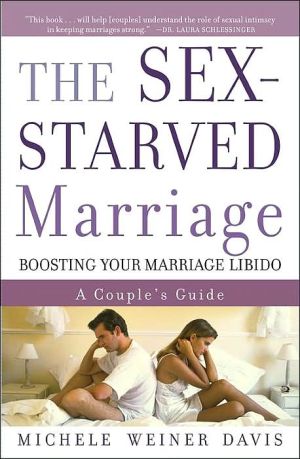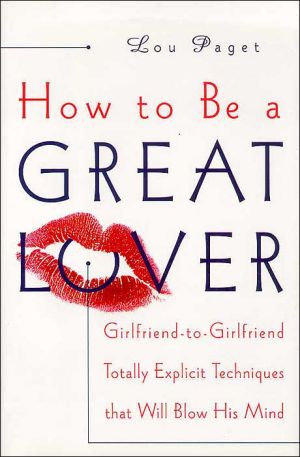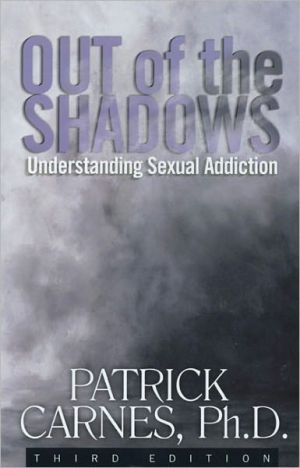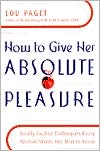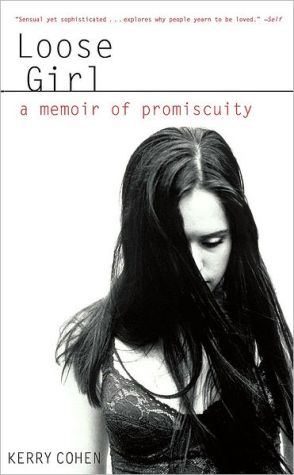I'd Rather Eat Chocolate: Learning to Love My Low Libido
“If I had a choice between having sex and reading a good book, the book wins. I notice I put in the adjective ‘good’—and that leaves me wondering if I’m not trying to put a better face on things. I still want people to read this and think, ‘Well, of course. If it’s a good book.’ But my boyfriend—the man I would eventually marry—would take even bad sex over a good book.”\ —From I’d Rather Eat Chocolate\ \ Joan is hardly ever in the mood. Kip is always in the mood. Does that sound like any...
Search in google:
“If I had a choice between having sex and reading a good book, the book wins. I notice I put in the adjective ‘good’—and that leaves me wondering if I’m not trying to put a better face on things. I still want people to read this and think, ‘Well, of course. If it’s a good book.’ But my boyfriend—the man I would eventually marry—would take even bad sex over a good book.”—From I’d Rather Eat ChocolateJoan is hardly ever in the mood. Kip is always in the mood. Does that sound like any couple you know?Joan Sewell is a funny, brave new writer who dares to reveal that sex in her house does not look anything like the sex you see in movies. When she learns that her husband, Kip, would have sex five or six times a week if he could have as much sex as he wanted (compared to her once or twice a month), Joan decides she’d better pluck up her sex drive before she ends up on the fast track to divorce court. I’d Rather Eat Chocolate is the witty, provocative chronicle of her search for a lift to her libido and what happens when none of the expert advice works. First she tries sexy underwear—until her husband realizes she is cheating on her thongs by wearing cotton panties. Then she reads that for stressed-out wives, a husband who does housework is the ultimate aphrodisiac—until she realizes that she is actually the slob in the relationship and the mess hasn’t decreased Kip’s sex drive any. When she reads John Gray’s advice to women to offer “quickies” if their husbands want sex and they are not in the mood, Joan realizes that this is the ultimate male trump card so she can never again say no to sex. Her fantasies begin to involve smothering John Gray with a pillow.Joan Sewell is scrappy, fearless, and hilarious, the “I Love Lucy” of low libido. Her memoir is laugh-out-loud funny. But it has a serious vein, too. How Joan and Kip work it out, and what they do when they “do it,” will give every woman hope that she can be true to herself and have a happy marriage. Publishers Weekly Sewell understood that a huge inequality existed between her and her husband, Kip, in their levels of sexual drive. With humor, she recounts her journey to reconciling this disparity, creating along the way an ad hoc social commentary on the way both men and women look at sex. Sewell consults many experts: marriage counselors, relationship experts, sexperts, women's magazines and Oprah. Sewell determines that much of the advice is based on the ideals of men, and she finds that many ideals of the prosex feminist revolution have morphed to focus on male desires rather than women's liberties. This first-time author disagrees that women should live by such standards and sets out to prove that a healthy relationship can be had despite vastly differing levels of desire. And while it isn't an easy journey (a fight over porn and a time of separate beds are just some of the hurdles), the love and openness of their marriage allows Joan and Kip to reach a conclusion by which they are both satisfied sexually and emotionally. Honest and accessible, this is not just a guide for libido-impaired individuals, but for anyone who wants to take a closer look at one subject that continues to gap the genders. (Feb.) Copyright 2006 Reed Business Information.
One HOW MUCH SEX DID YOU SAY?\ If I had a choice between reading a good book and having sex, the book wins. I notice I put in the adjective “good”—and that leaves me wondering if I’m not trying to put a better face on things. I still want people to read this and think, “Well, of course. If it’s a good book. But my boyfriend—the man I would eventually marry—would take even bad sex over a good book.\ CURIOSITY KILLS THE CAT\ Then I asked the question that really started the dominoes falling: I finally got the nerve to ask my boyfriend if he could have as much sex as he wanted, how much would that be? The fact is we hadn’t directly addressed our sex lives, even though we were way along into the relationship. We’d surely had our problems. But at this particular moment, my question was only half serious: casual curiosity after reading an article on men and sex in a glamour magazine.\ “As much sex as I wanted?” Kip sat down on the edge of the bed and slowly took off his shoes. I knew what he was thinking.\ “Yeah. As much as you wanted,” I repeated.\ Kip delayed answering by adopting a puzzled look of concentration as if the question would never have occurred to him before my asking it. “Oh, I don’t know…maybe about five or six times a week.”\ My eyebrows shot up into outer space. “Wow. Really?”\ “Yeah, I’d probably want one day off.”\ I looked intently at him. Was he joking? I decided he wasn’t. “That wouldn’t tire you out? Every day?”\ “No. It doesn’t have to be a big production or anything.”\ “Right.”\ “Four or five days can be just …you know… plain…”\ “Meat–and–potatoes sex.”\ “Yeah.” He knew what that meant from our discussions about Mars and Venus. “And a couple of times a week I’d like gourmet sex.” Mars and Venus again, code for extra–fancy sex.\ “Gourmet sex twice a week? Wow.” “Wow” was becoming my favorite fill–in exclamation. It shows surprise without necessarily designating a judgment.\ “Well, really, I’d be happy with it once a week.” He was making an effort to make his fantasy sex life more realistic. It wasn’t working for me.\ “Well, okay, um…Wow.” Yikes!\ Kip walked into the kitchen and got a Coke out of the fridge. I stood in the middle of the living room in wonder at how far apart we were. My arms were crossed over my chest as I stared down at the carpet. I concentrated on taking even breaths.\ “Of course I don’t expect that,” Kip called out from the kitchen. “That’s just my fantasy. No woman is going to want sex every day.”\ “How do you know? Maybe there are women who do want sex almost every day. Maybe you just didn’t look hard enough.”\ He walked back into the living room with the tiniest of smirks on his face. “Uh–huh. How many women are picking up guys for sex?”\ “Some.”\ “Not a lot.” Kip screwed off the bottle cap and took a couple of swallows.\ “Well, even if it is rare to find a woman who wants that much sex, shouldn’t you try anyway? Why settle?” I was feeling pettish by now.\ “Because she doesn’t exist.”\ Who was he trying to reassure, him or me? Of course she existed, just in smaller numbers. But didn’t he owe it to himself to try to find someone sexually compatible before settling for less? I didn’t want him to be deprived and unhappy, I didn’t want to be the one who held him back, I didn’t want to be the one he settled for. More than that, I was tired of always feeling apologetic for my drive.\ Kip sat down at his swivel chair and turned toward his desk. His way of saying enough, I’m not going to deal with this anymore. But I couldn’t let it lie.\ TEARS AND WHISPERS\ Clicking by the channels, I caught Oprah in midspeech saying that millions of women don’t want sex. She said low female libido is a problem that is, in her words, “big, big, big, big, big.” Whoa. I lunged for a blank videotape and tore open the packaging with my teeth. I jammed it into the VCR and sat down. “Thank you, thank you, talk–show gods.” With immense relief I listened to how millions of women were silently suffering in shame. Though there are books dealing with loss of desire in women that I read in private desperation, the literature didn’t come close to the impact of seeing women on television in tears and listening to their words of despair over their low sex drives. Many of the women Oprah had on her show were young women in young marriages. Oprah was telling her audience, speaking to the camera, that you’re not alone, millions of women have this hidden shame. I can only say I felt a mixture of exhilaration and gratitude while I watched. Somebody was talking about it, real people, and not just the sexperts. Women were talking about the pain, fear, insecurity, guilt, and shame of having low sexual desire. Yes. This is big.\ Terri: We have sex about every four to five months. This is a lot less than what my husband would like. I don’t enjoy sex. I dread it. My husband’s thought about divorce because of it. It would be totally fine if I never had sex again. (3)\ Shanna: We are in our first year of marriage and we get along fine except for one thing. I never want to have sex with him. I’m never in the mood. I’m afraid that he’s going to get tired of a sexless marriage and leave.\ Samantha: In our five years of marriage we have fought over and over about sex and my lack of desire. My husband has turned away from me. It makes me a nervous wreck.\ Betty: My marriage would be practically sexless if it were up to me. I’ve become totally uninterested, almost repulsed.\ Michelle: Before we were married, we would have sex probably three or four times a week. Ever since we’ve been married, our sex life is more “let’s get it over with.” It’s more a dread type thing. Some days, I do think it’s dirty and nasty.\ Women are using words like “dread” and “repulsion” and referring to sex as a personal invasion. Oprah notes seeing members of the audience in tears. Tears and dread and invasion. I think, “My God, are we just lying there taking it and faking it?” Judging by the above quotes, the answer is apparently yes.\ HOT, HOT, HOT\ But there were other shows telling me the opposite is true. On their cable television program, Berman & Berman: For Women Only, sister sexperts Laura and Jennifer Berman sent out one of their people to interview women on the street, and the word is women want a lot more sex:\ Female interviewer: How often do you have sex?\ \ Woman #1: As often as possible.\ Woman #2: Three to four times a week.\ Woman #3: I’m single, so I take sex when it is possible.\ Interviewer: How often is that?\ Woman #3: One or two a month.\ Interviewer: How often do you have sex with your partner?\ Woman #4: When I have a partner. Three or four times a day.\ Interviewer: A day?\ Woman #4: Well yeah, with the right partner.\ Dr. Laura Berman: That’s the key.\ Dr. Jennifer Berman: With the right partner.\ Laura B: With the right partner, but you can see there’s a range.\ I can’t imagine having sex three or four times a day. I just can’t. Even the Bermans’ effort to show what constitutes a wide range of frequency still leaves me feeling bruised. I can’t even make it to the low end. So, I’m still the odd girl out. But just when I was feeling down about not wanting sex at least every other day, Jennifer Berman took it down a notch for married folks:\ Jennifer B: But once you’re in, you know, married, routine life, I think about two to three times a week is pretty normal.\ Laura B: For you. Yeah. I mean it really is personally defined. But I want to hear what our audience thinks.\ Roxanne: And first of all let me tell you my disclaimer is I’ve been married a long time. Almost thirteen years. And we have sex about once a week…\ Laura B:…Yeah. What else. Who else? Does anyone else have another answer? What about right here? What’s your name?\ Bianca: Hi. My name is Bianca. And I’m in a great relationship. And for me, three to four times a week is great. But I would personally settle for seven.\ Laura B: Seven times?\ Jennifer B: Seven times a week. Every day.\ Laura B: And you know that’s nice because we’re hearing that on tape and in the audience. The myth is that women aren’t really game or wanting to have sex as much. And these women are saying, “Hey, anytime I can get it.”\ God, I feel so inadequate.\ The one woman on this show who said she had sex only once a week was apologetic about it, asking for understanding…you see, we’ve been married for thirteen years. Why was she apologizing? In the face of all these randy women, she felt abnormal. It’s how I feel even when watching from the safe distance of my living room. The Bermans don’t make me feel better about myself. The more they educate me, the more I’m cast as the outsider, the dysfunctional wife, the inhibited, repressed, hormonally deficient problem child. Even though the Bermans are careful to say what’s considered normal should be taken on an individual basis, they still are framing a range. Jennifer pulled the two–to–three–times–a–week statistic out of the air, while the rest of the show quoted women who wanted it every day or at any opportunity, whichever comes first. Then, with a touch of triumph, the Bermans ended their program saying that from what women were telling them, it’s a myth that we don’t want sex as much as men—we’re trying to get it as much as we can.\ So which is it? Are women more like the tearful bunch seen on Oprah or like the sexual enthusiasts on Berman & Berman?\ Two FREQUENCY\ Before our marriage, Kip and I had sex from three to four times a month according to my Faux Spontaneity Plan. The plan was really quite simple: have sex once a week for three weeks and you get one week off for good behavior. I might pleasantly surprise my man with a fourth week in a row some months, alternating with three–week months. That was only to show I was not actually planning a week off. But I did plan it. Three times a month, and the fourth time was the wild card, or in baseball terms, the change–up. Why choose once a week? I suppose it seemed like that was the general marker of time that’s permissible to not have sex before my boyfriend started making scratches on the bedroom wall marking the days.\ I wanted to know exactly where I stood in comparison to the national average. But I found that self–help books and sexperts are amazingly coy about sexual frequency. The experts try to wave away the appearance of having any interest in numbers, but they do show their biases.\ HOW MUCH IS NORMAL?\ One book with the irresistible title Not Tonight Dear claims, “Any man or woman is bound to prefer good sex twice a week to bad sex every night.” It sounds to me like twice a week is being offered as the low end of the scale (but it still can be okay if the sex is good). There are several times when the authors casually refer to having sex a “couple of times a week” as if it were an off–the–top–of–their–head example, even as it serves to establish that number as the norm. Any way you looked at it, I was clearly out of the running for what constitutes normal sexual relations.\ But I read an article in Newsweek that said statistics on sex might be unreliable given the current climate associating sex with solid relationships, good mental health, and emotional maturity:\ [Any] efforts to quantify our love lives must be taken with a shaker of salt. The problem, not surprisingly, is that people aren’t very candid about how often they have sex. Who wants to sound like a loser when he’s trying to make a contribution to social science? When pressed, nearly everyone defaults to a respectable “once or twice a week,” a benchmark that probably seeped into our collective consciousness with the 1953 Kinsey Report, a study that’s considered flawed because of its unrepresentative, volunteer sample. (2)\ Well, flawed though it may be, it hasn’t stopped the twice–a–week average from being adopted as a healthy minimum in a lot that I read and hear on talk shows. But thinking about my own marriage, I wondered if the twice–a–week average might also be in part the product of a compromise between the frequency of sex that men would love to have and the frequency women are willing to live with.\ LETTING IT SLIDE\ Patricia Love’s book Hot Monogamy deals with couples who have major sex–drive differences. For example, Love talks about one of her low–desire clients, Pam, who wants sex only three to four times a month. Love categorizes Pam as “rarely” wanting sex. (3) I’m insulted. In my playbook, I’d call three or four times a month about right.\ For some men, once–a–week sex is not good enough or kinky enough to keep them smiling through the next six days. And they’re going to let their wives or girlfriends know it in one way or another. For other men, once a week is barely enough for their tastes, but they may dislike pushing for more because of the endless arguments the wife or girlfriend may bring to bear on why she finds sex during the week so difficult. Or, like Kip, a man may feel ashamed of wanting more sex with his wife when she clearly doesn’t want much sex with him.\ Sure, motivating yourself to have sex twice a week will keep you in that magical statistical realm and out of the therapist’s chair. Still, even once a week, and we all kind of knowingly laugh—nothing that a little time management, romance, and a trip to Victoria’s Secret won’t fix. Once a week usually means having Saturday–night no–excuses–left sex. Some of us down that whiskey or hide in the bathroom having a precourage cigarette or joint before making our triumphant entrance into the bedroom, all sexy smiles and lingerie. Less than once a week and you’re looking pretty bad. You have a desire disorder. Boy! Now what do I do, Doc? Your relationship with your man will be gone over with a fine–tooth comb; your past will be examined for any signs of negativity about sex from parents, friends, teachers, priests, rabbis, or whoever. Oh, I know, I went through it.\ The Faux Spontaneity Plan got us through early courtship, but then our frequency dropped from sex three or four times a month for about a year to sex twice a month. That’s when our real troubles began.
\ From Barnes & NobleEven in the best of marriages, libidos are seldom equal. In the case of author Joan Sewell and her husband, Kip, the scales seemed disastrously uneven: Hubby was always ready for a sexual romp, while his darling Joan would generally prefer reading a good book to cavorting in the bedroom. Sewell's I'd Rather Eat Chocolate chronicles the couple's search to find a happy medium between full-time lust and personal honesty. This memoir maintains an upbeat, even humorous tone; but Sewell knows well that physical compatibility can be a deal breaker in marriages. To research the subject, she consulted with marriage counselors, relationship experts, sex specialists, women's magazines, and, yes, even Oprah. A candid approach to a major couple problem.\ \ \ \ \ Publishers WeeklySewell understood that a huge inequality existed between her and her husband, Kip, in their levels of sexual drive. With humor, she recounts her journey to reconciling this disparity, creating along the way an ad hoc social commentary on the way both men and women look at sex. Sewell consults many experts: marriage counselors, relationship experts, sexperts, women's magazines and Oprah. Sewell determines that much of the advice is based on the ideals of men, and she finds that many ideals of the prosex feminist revolution have morphed to focus on male desires rather than women's liberties. This first-time author disagrees that women should live by such standards and sets out to prove that a healthy relationship can be had despite vastly differing levels of desire. And while it isn't an easy journey (a fight over porn and a time of separate beds are just some of the hurdles), the love and openness of their marriage allows Joan and Kip to reach a conclusion by which they are both satisfied sexually and emotionally. Honest and accessible, this is not just a guide for libido-impaired individuals, but for anyone who wants to take a closer look at one subject that continues to gap the genders. (Feb.) Copyright 2006 Reed Business Information.\ \ \ First-time author Sewell is not sex phobic, but her libido is pretty much a no-go. Caught in a tug-o-war with her sweet and ardent partner (later husband), she here investigates the source of their mismatch. She finds experts to agree that women do tend to want sex less than men, but she also encounters plenty of the girls-gone-wild mentality. This sounds like a pretty grim story, but Sewell is a gleefully funny writer. Surprisingly, she and husband Kip did work out a system that satisfies them both, not perfectly but surprisingly well, with benefits for each. Her account of the negotiations and the give-and-take arrangements certainly depart from the usual and would be helpful to couples in similar situations. Moreover, as an armchair road trip and good story, it succeeds admirably. Singular and highly recommended for public and academic libraries.\ —Martha Cornog Copyright 2007 Reed Business Information\ \ \ \ \ \ Astonishingly frank and often funny disclosures about the author's sex life, with a serious underlying message about the actual differences between the libidos of women and men. In this debut work, Sewell quickly engages the reader with her honest revelations about the disparity between her sex drive and that of Kip, her boyfriend, who becomes her husband despite these differences. The title sums it up: In a contest between sex and chocolate, she'll take chocolate every time. She is not one to feign a headache, however. Sewell recreates many of the couple's early discussions about their sexual disconnect and what to do about it, their subsequent sessions with a sex therapist, who she loathes, the near-disintegration of their marriage and the compromise that they eventually work out. Through their mostly extraordinarily amiable and rational conversations, the reader learns of their sexual fantasies and their feelings about pornography, masturbation, orgasm, quickies and oral and anal sex. Woven into this highly personal narrative is the research that Sewell did into what the so-called experts are saying about the female libido and what messages the mainstream media are sending. She watches Oprah Winfrey Show and Sex and the City, reads Ladies Home Journal, O and other magazines, John Gray's Mars and Venus in the Bedroom and advice books with titles such as Married Lust and Hot Monogamy-together, she and Kip try to watch The Better Sex Guide video series. She concludes that even though much of the sex advice women receive is from women, it is based upon the sexual happiness of men. What's needed, she argues, is acceptance of and respect for the idea by both sexes that there's a significantbiological difference in their sex drives. Not weighty, but often witty.\ \


